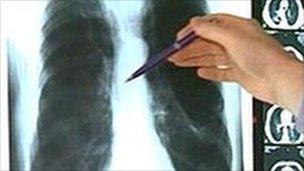Lung emergencies at 10 year high in Wales, say NHS figures
- Published

COPD includes the conditions bronchitis and emphysema and causes breathing difficulties
The number of emergency hospital admissions for people with lung conditions in Wales is at a 10 year high, NHS figures show.
The British Lung Foundation Wales said patients with conditions like emphysema needed to be helped earlier.
Its chairman warned that figures could rise for years as more people who smoked 20 years ago - when smoking was at a peak - become ill.
The Welsh government said it was working to improve community help.
The figures show that in 2010-11, 46,218 people were admitted to Welsh hospitals as emergency cases with lung disorders.
The proportion of admissions were highest in Merthyr Tydfil and lowest in Powys.
Dr Patrick Flood-Page, chairman of British Lung Foundation Wales, said the most common conditions which could lead to emergency hospital treatment were chronic obstructive pulmonary disease (COPD) - which includes chronic bronchitis and emphysema - along with pneumonia.
He said different factors - like viruses and cold weather - could affect the figures, but he believed the over-riding reason for the increase was smoking trends.
"When you smoke it takes a while for this condition (COPD) to show itself," said Dr Flood-Page, who works as a consultant chest physician in Newport.
"So if the peak of the number of people smoking was 20 years ago, the peak of people with the condition comes 20 years later.
"Lots of people smoked back then, although it's been falling since.
"It's likely that COPD will continue to increase for the next few years, possibly to about 2020.
"That's expected, based on the number of people smoking 20 years ago or thereabouts."
Early diagnosis
He said it was important to do as much as possible to prevent people with lung disorders ending up in hospital, such as treating them in the community.
He said waiting lists were too high for a scheme called pulmonary rehabilitation, which helps patients get fitter and understand how to manage their condition, and urged the Welsh government to put pressure on local health boards to try to reduce them.
He added that more work to help people give up smoking and to prevent people from starting was also essential.
Chris Mulholland, head of British Lung Foundation Wales, said one in five people in Wales were affected by lung conditions, and helping them earlier would ease the burden on the NHS.
"We can't afford to focus solely on people with severe lung disease. We have to get in early," she said.
"This means focusing on improving lung health, and early diagnosis and treatment, so we can help people with mild or moderate symptoms too."
Self-management
Brian Lawley, who was admitted to hospital as an emergency case with COPD, said pulmonary rehabilitation meant he was now able to manage his condition.
"It's all part of self-management to prevent yourself getting to the stage where you have to go into hospital. Thankfully I haven't been in hospital since 2003," said Mr Lawley, 65, who runs Breathe Easy, a support group for people with lung conditions in Swansea.
"I was also a smoker but stopped after getting ill. The first time you go for a chest X-ray you stop. You think all sorts of things...
"I think the thought of that is scary for a lot of people so they don't go for help when they start to get ill. But the sooner lung conditions are diagnosed the sooner you can get it under control.
"With COPD you can't cure it, but you can try to slow down its advance."
The Welsh government said it was working to reduce waiting lists for pulmonary rehabilitation.
"We have been working together with the British Lung Foundation and local health boards (LHBs) to identify the challenges facing pulmonary rehabilitation services across Wales," a spokesman said.
"Each LHB in Wales now provides pulmonary rehabilitation services, although access to these does vary across Wales, particularly for patients in deep rural areas.
"Each LHB has an action plan in place for improving pulmonary rehabilitation provision across their locality.
"The Welsh government is in contact with LHBs to monitor current service capacity to ensure that the levels of demand are met and long waits are reduced. "
- Published16 October 2011
- Published23 November 2010
- Published23 November 2010
- Published24 May 2010